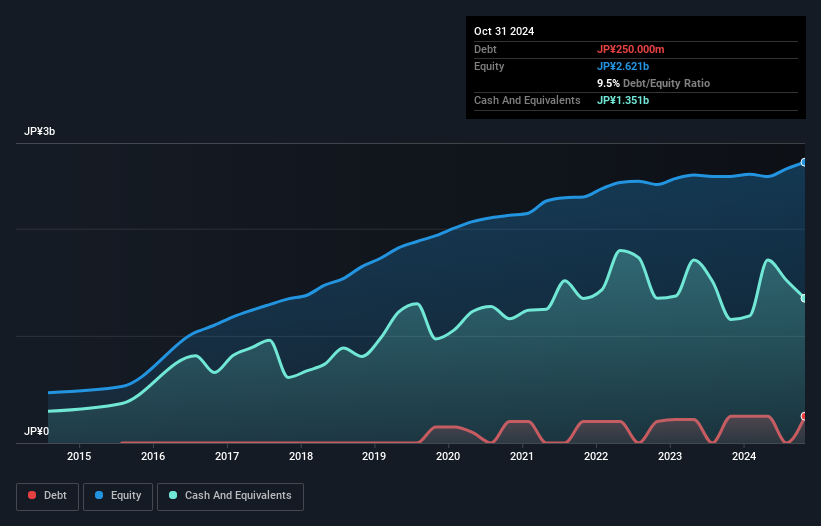- Japan
- /
- Interactive Media and Services
- /
- TSE:3930
We Think Hatena (TSE:3930) Can Manage Its Debt With Ease

Warren Buffett famously said, 'Volatility is far from synonymous with risk.' So it might be obvious that you need to consider debt, when you think about how risky any given stock is, because too much debt can sink a company. We note that Hatena Co., Ltd. (TSE:3930) does have debt on its balance sheet. But is this debt a concern to shareholders?
When Is Debt A Problem?
Debt assists a business until the business has trouble paying it off, either with new capital or with free cash flow. In the worst case scenario, a company can go bankrupt if it cannot pay its creditors. However, a more usual (but still expensive) situation is where a company must dilute shareholders at a cheap share price simply to get debt under control. Of course, plenty of companies use debt to fund growth, without any negative consequences. When we examine debt levels, we first consider both cash and debt levels, together.
Check out our latest analysis for Hatena
What Is Hatena's Net Debt?
The chart below, which you can click on for greater detail, shows that Hatena had JP¥250.0m in debt in October 2024; about the same as the year before. However, it does have JP¥1.35b in cash offsetting this, leading to net cash of JP¥1.10b.

How Healthy Is Hatena's Balance Sheet?
According to the last reported balance sheet, Hatena had liabilities of JP¥569.0m due within 12 months, and liabilities of JP¥40.0m due beyond 12 months. On the other hand, it had cash of JP¥1.35b and JP¥568.0m worth of receivables due within a year. So it can boast JP¥1.31b more liquid assets than total liabilities.
This surplus liquidity suggests that Hatena's balance sheet could take a hit just as well as Homer Simpson's head can take a punch. With this in mind one could posit that its balance sheet means the company is able to handle some adversity. Succinctly put, Hatena boasts net cash, so it's fair to say it does not have a heavy debt load!
Another good sign is that Hatena has been able to increase its EBIT by 27% in twelve months, making it easier to pay down debt. There's no doubt that we learn most about debt from the balance sheet. But it is Hatena's earnings that will influence how the balance sheet holds up in the future. So when considering debt, it's definitely worth looking at the earnings trend. Click here for an interactive snapshot.
Finally, while the tax-man may adore accounting profits, lenders only accept cold hard cash. Hatena may have net cash on the balance sheet, but it is still interesting to look at how well the business converts its earnings before interest and tax (EBIT) to free cash flow, because that will influence both its need for, and its capacity to manage debt. Over the last three years, Hatena reported free cash flow worth 19% of its EBIT, which is really quite low. For us, cash conversion that low sparks a little paranoia about is ability to extinguish debt.
Summing Up
While we empathize with investors who find debt concerning, you should keep in mind that Hatena has net cash of JP¥1.10b, as well as more liquid assets than liabilities. And we liked the look of last year's 27% year-on-year EBIT growth. So is Hatena's debt a risk? It doesn't seem so to us. When analysing debt levels, the balance sheet is the obvious place to start. However, not all investment risk resides within the balance sheet - far from it. For example, we've discovered 3 warning signs for Hatena (1 makes us a bit uncomfortable!) that you should be aware of before investing here.
When all is said and done, sometimes its easier to focus on companies that don't even need debt. Readers can access a list of growth stocks with zero net debt 100% free, right now.
Valuation is complex, but we're here to simplify it.
Discover if Hatena might be undervalued or overvalued with our detailed analysis, featuring fair value estimates, potential risks, dividends, insider trades, and its financial condition.
Access Free AnalysisHave feedback on this article? Concerned about the content? Get in touch with us directly. Alternatively, email editorial-team (at) simplywallst.com.
This article by Simply Wall St is general in nature. We provide commentary based on historical data and analyst forecasts only using an unbiased methodology and our articles are not intended to be financial advice. It does not constitute a recommendation to buy or sell any stock, and does not take account of your objectives, or your financial situation. We aim to bring you long-term focused analysis driven by fundamental data. Note that our analysis may not factor in the latest price-sensitive company announcements or qualitative material. Simply Wall St has no position in any stocks mentioned.
About TSE:3930
Excellent balance sheet and good value.
Market Insights
Community Narratives



